I still struggle with reading like I have struggled these past few years. Especially since my debut novel, Nuclear Family, was being published this June, I began 2022 with a lot of anxiety.
This got in the way of reading and writing as much as I hoped, which I had been warned about when facing publicity obligations and book promotion. I’ve since leaned into becoming slower and more intentional about what I need. Having my novel out now, standing alongside writers whom I admire a great deal, I’ve never felt more alive. Every year happens to feel like my best reading year ever. But more than anything, I’m grateful to live—among books and a world made better by art and beauty, and the artists who help us find a way.


 I started this year with Choi Eunyoung’s Shoko’s Smile, translated by Sung Ryu. Every time I read Korean literature in translation, and especially short stories, I wonder why I should read anything else. Seriously. Korean short story writers are unmatched! Likewise, I’m forever in awe and grateful for The Smoking Tigers, a collective of literary translators working from Korean to English. At the end of 2019, I read Cursed Bunny by Bora Chung, translated by Anton Hur. It’s out this December from Algonquin Books, and I couldn’t recommend it enough. So I was really hyped for Anton Hur’s translation of Love in the Big City by Sang Young Park. Reading that book about queer love in contemporary Seoul meant the world. Starting the year with these two books, I would’ve been happy if I didn’t read anything else.
I started this year with Choi Eunyoung’s Shoko’s Smile, translated by Sung Ryu. Every time I read Korean literature in translation, and especially short stories, I wonder why I should read anything else. Seriously. Korean short story writers are unmatched! Likewise, I’m forever in awe and grateful for The Smoking Tigers, a collective of literary translators working from Korean to English. At the end of 2019, I read Cursed Bunny by Bora Chung, translated by Anton Hur. It’s out this December from Algonquin Books, and I couldn’t recommend it enough. So I was really hyped for Anton Hur’s translation of Love in the Big City by Sang Young Park. Reading that book about queer love in contemporary Seoul meant the world. Starting the year with these two books, I would’ve been happy if I didn’t read anything else.



 One of the biggest novels of the year for me was Disorientation by Elaine Hsieh Chou. I found it bold, hilarious, and razor-sharp, and for a long while it was the only thing anyone was talking about! It was especially wonderful seeing all of my friends in academia feeling all kinds of ways about the book. Next, I read Ghost Forest by Pik-Shuen Fung, a stunning novel in short chapters, which I returned to and re-read as I moved through the book. With a similar fervor around Chou’s novel, readers in my immediate circle kept telling me to pick up Vladimir by Julia May Jonas. From the opening pages, the frame narrative and ensuing unhinged chaos is ablaze and full of the kind of energy I look for in first-person novels. Next, I read Little Rabbit by Alyssa Songsiridej. We were both National Book Foundation ‘5 under 35’ honorees this year, so I was blown away reading Little Rabbit shortly after meeting at the ceremony. The ending of that book is magnificent! I re-read it all the time now when I’m looking for a thunderclap of emotion and inspiration. Though it’s primarily about a writer’s intensifying relationship with a choreographer, I was struck by how it’s also about the intimacy, betrayal, and love between old friends.
One of the biggest novels of the year for me was Disorientation by Elaine Hsieh Chou. I found it bold, hilarious, and razor-sharp, and for a long while it was the only thing anyone was talking about! It was especially wonderful seeing all of my friends in academia feeling all kinds of ways about the book. Next, I read Ghost Forest by Pik-Shuen Fung, a stunning novel in short chapters, which I returned to and re-read as I moved through the book. With a similar fervor around Chou’s novel, readers in my immediate circle kept telling me to pick up Vladimir by Julia May Jonas. From the opening pages, the frame narrative and ensuing unhinged chaos is ablaze and full of the kind of energy I look for in first-person novels. Next, I read Little Rabbit by Alyssa Songsiridej. We were both National Book Foundation ‘5 under 35’ honorees this year, so I was blown away reading Little Rabbit shortly after meeting at the ceremony. The ending of that book is magnificent! I re-read it all the time now when I’m looking for a thunderclap of emotion and inspiration. Though it’s primarily about a writer’s intensifying relationship with a choreographer, I was struck by how it’s also about the intimacy, betrayal, and love between old friends.
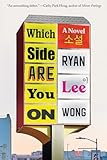
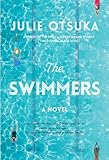



 The long game of writing for me was always getting to the point where I could receive ARCs. Fortunately, I shared a publisher with Ryan Lee Wong, and I was super excited to read the excellent Which Side Are You On, a novel about solidarity, organizing, and movement building across generations. I’m grateful this book exists and for the impact it will surely have. I was then drawn to Julie Otsuka’s The Swimmer—especially when Buddha in the Attic is one of our greatest examples of first-person plural narration out there—and I was surprised and delighted by its shifts in latter chapters. Next, I read Brown Girls by Daphne Palasi Andreades, which I thought took Otsuka’s incredible use of first-plural even further, across time and space, and I was amazed by the scope and precision and music of her language. My reading this time of year turned to shorter novels. I needed a reprieve from thinking about fiction, so I read Time is a Mother by Ocean Vuong and Ask the Brindled by Noʻu Revilla, winner of the 2021 National Poetry Series. No one else is writing with as much ferocity and grace as Revilla.
The long game of writing for me was always getting to the point where I could receive ARCs. Fortunately, I shared a publisher with Ryan Lee Wong, and I was super excited to read the excellent Which Side Are You On, a novel about solidarity, organizing, and movement building across generations. I’m grateful this book exists and for the impact it will surely have. I was then drawn to Julie Otsuka’s The Swimmer—especially when Buddha in the Attic is one of our greatest examples of first-person plural narration out there—and I was surprised and delighted by its shifts in latter chapters. Next, I read Brown Girls by Daphne Palasi Andreades, which I thought took Otsuka’s incredible use of first-plural even further, across time and space, and I was amazed by the scope and precision and music of her language. My reading this time of year turned to shorter novels. I needed a reprieve from thinking about fiction, so I read Time is a Mother by Ocean Vuong and Ask the Brindled by Noʻu Revilla, winner of the 2021 National Poetry Series. No one else is writing with as much ferocity and grace as Revilla.

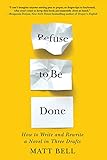


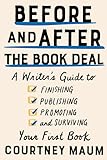 I spent most of the latter half of the year working with graduate students, and reading their works-in-progress, as an affiliate faculty in fiction at the Antioch University Los Angeles low-residency MFA program. Each month we met for a book circle discussion, and together we read The Art of Revision by Peter Ho Davies, Refuse to Be Done by Matt Bell, How to Read Now by Elaine Castillo, Dear Senthuran by Akwaeke Emezi, and Before and After the Book Deal by Courtney Maum, all of which inspired great discussions on how to move on the page and through the world as readers and writers. My students this year were Samantha Rahmani, Maggie Lam, Liz Iversen, Semaj Saint Garbutt, and Sierra-Nicole Debinion; I’m certain you’ll see books from them in the future.
I spent most of the latter half of the year working with graduate students, and reading their works-in-progress, as an affiliate faculty in fiction at the Antioch University Los Angeles low-residency MFA program. Each month we met for a book circle discussion, and together we read The Art of Revision by Peter Ho Davies, Refuse to Be Done by Matt Bell, How to Read Now by Elaine Castillo, Dear Senthuran by Akwaeke Emezi, and Before and After the Book Deal by Courtney Maum, all of which inspired great discussions on how to move on the page and through the world as readers and writers. My students this year were Samantha Rahmani, Maggie Lam, Liz Iversen, Semaj Saint Garbutt, and Sierra-Nicole Debinion; I’m certain you’ll see books from them in the future.

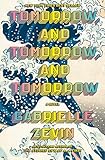 As pub month drew to a close, the months that followed left me feeling exhausted and bereft. However, Mateo Askaripour’s Black Buck brought me back to life. He wrote a wonderful review of my debut in the NYT, so reading his book made me feel incredibly honored and blessed! Written as a sales manual, it doubles as a model of storytelling at its finest. Another novel that brought me back to life/reading was Gabrielle Zevin’s Tomorrow, and Tomorrow, and Tomorrow. It’s another book I heard everyone around me praising, and for good reason. I mean it’s phenomenal and off the charts.
As pub month drew to a close, the months that followed left me feeling exhausted and bereft. However, Mateo Askaripour’s Black Buck brought me back to life. He wrote a wonderful review of my debut in the NYT, so reading his book made me feel incredibly honored and blessed! Written as a sales manual, it doubles as a model of storytelling at its finest. Another novel that brought me back to life/reading was Gabrielle Zevin’s Tomorrow, and Tomorrow, and Tomorrow. It’s another book I heard everyone around me praising, and for good reason. I mean it’s phenomenal and off the charts.
 If there’s one book of the year for me, it’s Julian Aguon’s No Country for Eight-Spot Butterflies: “[N]o military on earth is sensitive enough to perceive something as soft as the whisper of another worldview.” I can’t stop thinking about that line. Aguon writes about protecting life and all we must hold sacred—at the intersection of demilitarization and a global climate justice movement. He reminds us of the importance of remarking beauty, storytelling and awareness as medicine. This book will expand your imagination and nourishes the soul of the world.
If there’s one book of the year for me, it’s Julian Aguon’s No Country for Eight-Spot Butterflies: “[N]o military on earth is sensitive enough to perceive something as soft as the whisper of another worldview.” I can’t stop thinking about that line. Aguon writes about protecting life and all we must hold sacred—at the intersection of demilitarization and a global climate justice movement. He reminds us of the importance of remarking beauty, storytelling and awareness as medicine. This book will expand your imagination and nourishes the soul of the world.

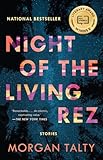
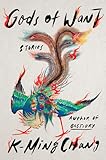


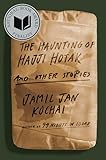 This was an amazing year for short stories, and I started off with Jean Chen Ho’s Fiona and Jane, a moving exploration of friendship and loss. An iconic author! Later in the year, I finished Night of the Living Rez by Morgan Talty, which I recommend any chance I get. It’s so damn good. After reading the last sentence of the final short story, I just sat there feeling stunned. Reading Gods of Want by K-Ming Chang reinforced my belief that she’s one of our greatest living writers working today. Since it was announced, I looked forward to Ling Ma’s Bliss Montage, and I loved it tremendously. Then I read the highly-anticipated If I Survive You by Jonathan Escoffery. The individual stories and their shifts across characters, point-of-view, and time, their overall cumulative effect, made this book a knock-out with no misses. As I finish writing this, I’m in the middle of reading The Haunting of Hajji Hotak by Jamil Jan Kochai.
This was an amazing year for short stories, and I started off with Jean Chen Ho’s Fiona and Jane, a moving exploration of friendship and loss. An iconic author! Later in the year, I finished Night of the Living Rez by Morgan Talty, which I recommend any chance I get. It’s so damn good. After reading the last sentence of the final short story, I just sat there feeling stunned. Reading Gods of Want by K-Ming Chang reinforced my belief that she’s one of our greatest living writers working today. Since it was announced, I looked forward to Ling Ma’s Bliss Montage, and I loved it tremendously. Then I read the highly-anticipated If I Survive You by Jonathan Escoffery. The individual stories and their shifts across characters, point-of-view, and time, their overall cumulative effect, made this book a knock-out with no misses. As I finish writing this, I’m in the middle of reading The Haunting of Hajji Hotak by Jamil Jan Kochai.

 I’ve also been fortunate to receive more gifts from the future, as Alexander Chee calls them. I read an ARC of Flux by Jinwoo Chong, whose debut novel is a genre and time-bending masterpiece coming out in March 2023. It’s such a compelling, deft, and mesmerizing book taking Korean American literature in a riveting and bold direction. I also had the chance to blurb and get an early read of Megan Kamalei Kakimoto’s debut short story collection, Every Drop is a Man’s Nightmare, outing August 2023. It’s the first blurb I’ve written as an author, which I’ll include here: “Megan Kamelei Kakimoto’s collection blooms with opulent and tender language. She weaves an intimate and expansive worldview of Hawaiʻi as sacred, abundant, and thoroughly alive with ancestral stories. Kakimoto is one of Hawaiʻi’s most brilliant new voices. The power of her monumental debut will reverberate across generations past and those yet to come.”
I’ve also been fortunate to receive more gifts from the future, as Alexander Chee calls them. I read an ARC of Flux by Jinwoo Chong, whose debut novel is a genre and time-bending masterpiece coming out in March 2023. It’s such a compelling, deft, and mesmerizing book taking Korean American literature in a riveting and bold direction. I also had the chance to blurb and get an early read of Megan Kamalei Kakimoto’s debut short story collection, Every Drop is a Man’s Nightmare, outing August 2023. It’s the first blurb I’ve written as an author, which I’ll include here: “Megan Kamelei Kakimoto’s collection blooms with opulent and tender language. She weaves an intimate and expansive worldview of Hawaiʻi as sacred, abundant, and thoroughly alive with ancestral stories. Kakimoto is one of Hawaiʻi’s most brilliant new voices. The power of her monumental debut will reverberate across generations past and those yet to come.”
 There’s a passage in Bliss Montage about a writer-narrator saying that the person who entered the dream of publishing a book isn’t the same person who woke up, having overslept while everyone else moved on, while her life remained frozen and needed time to thaw out. This moment struck a deep chord. There’s more I hope to read before the year is over, if only because of how I’ve reached for these books for light and warmth. Like right now, I’m thinking I’ve spent too much time on this essay as is, and I need to get back to reading! Currently, I’m really enjoying another book from the future, Gina Chung’s Sea Change, out April 2023, an exquisite debut about the oceanic depths of longing and loss, with the narrator Ro being one of my favorite Korean American characters of all time.
There’s a passage in Bliss Montage about a writer-narrator saying that the person who entered the dream of publishing a book isn’t the same person who woke up, having overslept while everyone else moved on, while her life remained frozen and needed time to thaw out. This moment struck a deep chord. There’s more I hope to read before the year is over, if only because of how I’ve reached for these books for light and warmth. Like right now, I’m thinking I’ve spent too much time on this essay as is, and I need to get back to reading! Currently, I’m really enjoying another book from the future, Gina Chung’s Sea Change, out April 2023, an exquisite debut about the oceanic depths of longing and loss, with the narrator Ro being one of my favorite Korean American characters of all time.
I’ve never felt more warmth than when I’ve connected with my own readers, and especially when I gathered around a book as an audience of fellow readers, as we would commune around a fire, which is a reminder Julian Aguon shared at a recent book event. How we need not be so cold in such bitter times.
Here is a map of my life and how it’s been set ablaze.
The post A Year in Reading: Joseph Han appeared first on The Millions.
Source : A Year in Reading: Joseph Han














